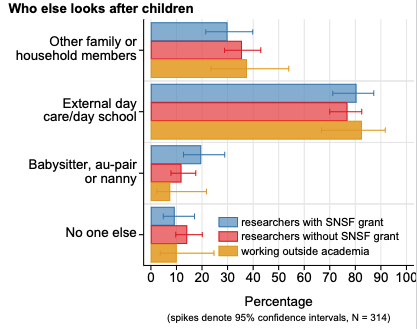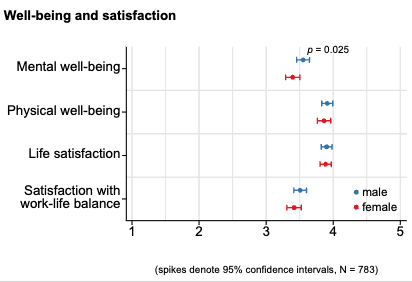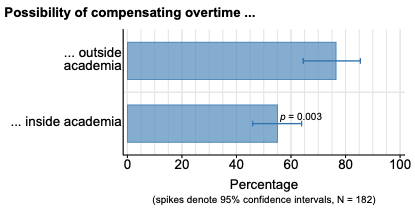PhD characteristics and success in the first application for a CTC grant
In our current newsletter, we explore data on the PhDs completed by CTC participants. Our sample compromises of 3’342 applications. Overall, 43.2% of the applicants are women and 56.8% are men. With respect to research domain, 28.8% completed their PhD in the humanities and social sciences, 37.9% in mathematics, natural and engineering sciences, and 33.3% in biology and medicine.
Ranking of PhD-awarding university
CTC collected the THE World University Ranking of the PhD-granting institution at the time of PhD obtention, as information on the environment in which the PhD was received. A logistic regression analysis shows that the ranking of the PhD–awarding university, on its own, does not differentiate successful from unsuccessful application.

Time from obtaining PhD to first observed grant application
We examine the time between PhD completion and the funding decision for their first observed grant application. A logistic regression analysis shows no relationship between time since PhD completion and success in the first observed grant application (OR = 1.00), controlling for cohort, research domain, and grant scheme. This suggests that time since PhD completion alone does not distinguish successful from unsuccessful applications.
The funding behind the PhD
Nearly all CTC participants (99%) reported at least one source of income during their PhD. The most common sources were employment within a project (52%), such as a PhD salary funded by a grant, individual grants (40%), and assistant or similar positions (35%). Less common sources included financial support from family, partners, or friends (6%), external employment unrelated to the PhD (5%), external employment related to the PhD (3%), medical residency positions (2%), loans (2%), or other unspecified sources (2%). Participants could report multiple income sources.
Award winning achievements
Overall, 27% of CTC applicants received a prize for their dissertation. The proportion was similar for men (28%) and women (27%), and also comparable across research domains: 26% in the humanities and social sciences, and 28% in both mathematics, natural and engineering sciences, and biology and medicine.

Want to read more?
Download newsletter/previous newsletter
7th wave of the CTC Study now published
We are pleased to mark the completion of another survey year and are exited to announce that with the 2024 data, we have already published the 7th wave of the CTC study. These data can be requested on SWISSUbase.
We would also like to sincerely thank our participants for their long-standing support.
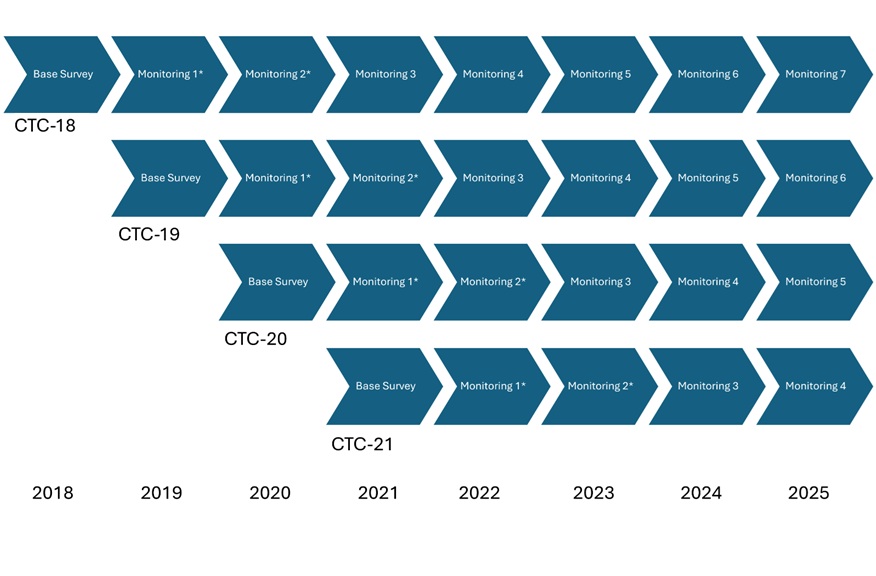
SNSF Grants Of CTC Participants
In order to deepen the understanding of the career paths of CTC participants, we conducted analyses taking into account the four different SNSF funding schemes.
Applications observed by the CTC study
Out of 4’744 applications tracked in the originally observed funding schemes (new grants like the SNSF Starting Grant were excluded for this analysis) in the CTC study to date, 1’854 have received funding from the SNSF (39%). The majority of these (1’390) were awarded under the Early Postdoc.Mobility and Postdoc.Mobility schemes, followed by 289 Ambizione grants, 116 Eccellenza grants, and 59 PRIMA grants.
Most early terminations are linked to job changes
Given the differing durations of the four schemes the majority of mobility grants have concluded (73%), whereas only 11% of Ambizione, 3% of Eccellenza, and 7% of PRIMA grants have reached completion at this stage. In addition to completed grants, a total of 109 (10%) grants were discontinued before their planned end — for a variety reasons. In 64% of these 109 cases, researchers accepted new job opportunities and chose not to continue with their grant. Another 19% secured alternative research funding. Premature terminations were also linked to personal and institutional factors: 6% ended early due to family obligations, 3% due to dissatisfaction with the host institution, and 8% for other reasons.
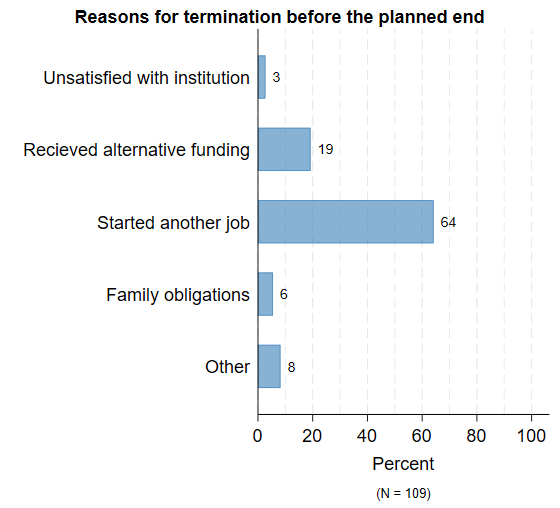
Grantees spend more time on research and less on teaching and side tasks
All survey participants engaged in academic research at the time of the survey — whether funded by an SNSF grant, other sources, or research-related employment — were asked how they allocate their total working time across different activities. Clear differences emerged between researchers with and without SNSF grants. Those with SNSF career funding spend significantly more of their time on research activities (79% vs. 69%, p < 0.001), while devoting less time to teaching (10% vs. 16%, p < 0.001).

Beyond differences in time allocation for the activities reported above, grantees and non-grantees also differ in the types of tasks they take on in addition to their research work. Researchers without SNSF career funding are more frequently involved in giving or assisting with courses (59% vs. 49%, p < 0.001) and supervising bachelor’s and master’s theses (59% vs. 53%, p < 0.001).
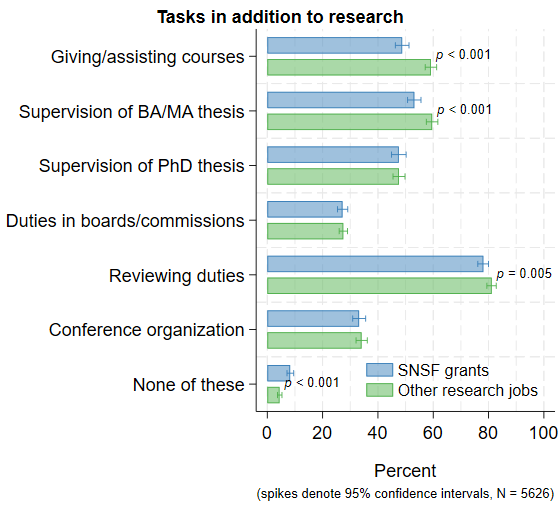
Want to read more?
Download newsletter / previous newsletters
Application Patterns Among CTC Participants (March, 2025)
In our ongoing effort to monitor and understand career paths of CTC participants, we conducted an analysis of application patterns using comprehensive data collected through successive waves of our monitoring surveys.
Distribution of Application Outcomes
Our analysis reveals a nuanced landscape of application outcomes among the CTC participants. Of the 3729 participants analyzed, 46.0% experienced one failed application, while 28.5% succeeded in their single attempt. Participants with mixed outcomes, such as one funded and one not funded application, accounted for 8.9%. A smaller percentage had consistent outcomes over multiple applications, with 8.6% reporting two not funded and 4.6% reporting two funded applications. Notably, a minor segment (3.4%) submitted three or more applications.

Application Patterns by Funding Scheme
Distribution by funding scheme reveals distinct patterns of repeated application behaviors. Across five analyzed funding schemes, we see it is most common for participants to submit multiple applications to earlier career funding schemes such as Postdoc Mobility grants, which are then later followed up by applications to the more senior funding schemes such as the Eccellenza grant.
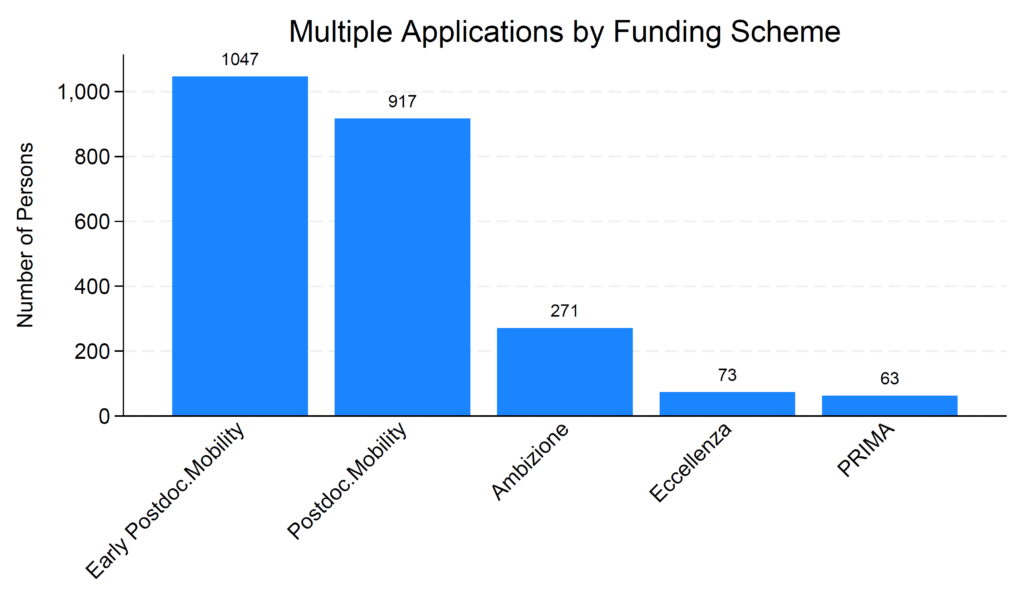
Academic Positions and Grant Applications
Are there differences in the distributions of academic positions between those who received a grant and those who did not? The distribution of academic positions between the two groups is largely similar, with only small variations. Notably, there’s a slightly higher proportion of professors among those who secured a grant.

This analysis offers insights into the distributions of application patterns as well as academic positions across the CTC over time. Continued monitoring and analysis will further illuminate trends and inform targeted support and policy measures.
Want to read more?
Download Newsletter 2025/1 [.pdf] / Previous newsletters.
Changes in working conditions during and after the pandemic
In 2021, we introduced new questions to our monitoring survey to better understand how the pandemic-induced measures have impacted working conditions over time.
In fall 2021, researchers spent an average of 41% of their work time at home, decreasing to 29% by 2023. During this period, women (2021: 45%; 2023: 31%) consistently worked from home more frequently than men (2021: 44%; 2023: 27%) and parents (2021: 46%; 2023: 31%) more often than those without children in the household (2021: 44%; 2023: 27%). In 2023, women and parents worked from home significantly more frequently than men and those without children (p < 0.001). Researchers in the humanities and social sciences had the highest percentage of remote work compared to other disciplines. This is possibly due to differences in workplace infrastructure and requirements. While the share of remote work decreased overall in the subsequent two years, the gap between disciplines remained.

Overall, participants expressed sufficient available resources as well as a physically adequate workspace at home. Over time, women were slightly more able than men to maintain boundaries between work and private life (2023: p < 0.001) and reported higher efficiency when working from home (2022: p = 0.001, 2023: p < 0.001).

Want to read more?
Download Newsletter 2024/2 [.pdf] / Previous newsletters
A closer look into participants’ career aspirations
By the time CTC participants apply for an SNSF career funding scheme, over three-quarters (76%) aspire to a full tenured professorship. Four years later, this share has decreased markedly to 52% among the same individuals. Many of those who initially aspired to a full tenured professorship have shifted their aspirations to scientific positions both within and outside of academia. Over time, although the share of those aspiring to management positions has increased, the majority of CTC participants still aspire to positions within academia.

This analysis draws on longitudinal data from two cohorts of the CTC study. Visit SWISSUbase for more information on the Scientific Use Files of the Career Tracker Cohorts study.
Review of SNSF career development funding schemes underway
The SNSF has launched a fundamental review of funding for early-career scientists. This review aims not only to improve the working conditions of early-career scientists but also to strengthen the development of research. The Career Tracker Cohort Study has provided an important empirical basis for the ongoing review. Visit the SNSF website for more information.
Insights into postdoc life: Balancing effort and reward
The pursuit of a career in research after obtaining a doctorate is highly sought after, but particularly among postdocs, many compromises must be made and sacrifices endured. Over the last years surveying postdocs within the SNSF Career Tracker Cohorts study (CTC), the data point to ambivalences many postdocs face when balancing effort and reward.
Academic renown or a work-life balance?
Still, most participants in the CTC study attach higher importance to work-life balance considerations than achieving academic renown. More than half (51.1%) of those surveyed in the CTC study consider a satisfactory work-life balance a very important aspect of their future career. In contrast, working in a renowned academic environment is not the top priority for many in the CTC study. Instead, 56.2% of CTC respondents attach very high importance to having a secure job.
Ambitions to work as an academic researcher again in the future
It is apparent from the data that a non-negligible share of study participants are contemplating pursuing career paths outside of academia. Looking at those in the CTC data who are employed outside academia, 60.4% have little or no ambition at all to work in academia again one day. Among the reasons for the lack of desire to work as an academic researcher again, the most prominent factors include the appeal of alternative career paths outside academia, perceptions of poor work-life balance in academia, excessive stress associated with academic jobs, and a harsh work atmosphere. Interestingly, perceptions of the difficulties of getting funding or a suitable or tenured position do not appear to influence respondents’ ambition to pursue a future career in academia.
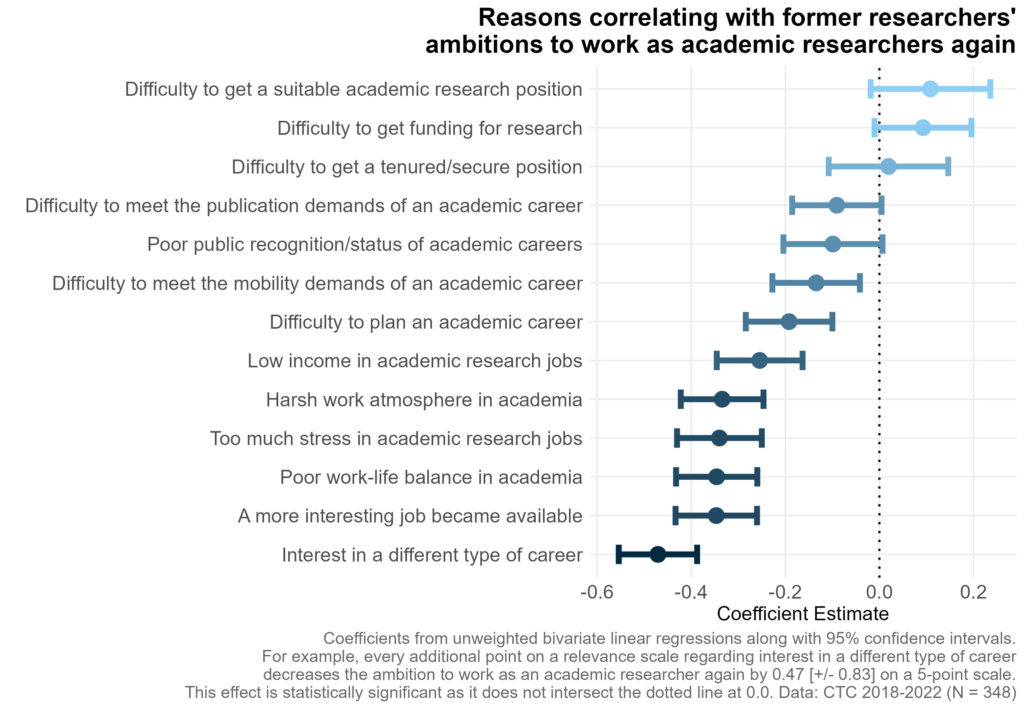
Want to read more?
Download Newsletter 2024/1 [.pdf] / Previous newsletters
Newsletter 2023/2
The spring surveys have concluded successfully. In total, 1494 people across the four cohorts participated in the survey, yielding an impressive response rate of 56%. We extend our gratitude to all participants for generously dedicating their time and energy. We highly appreciate each contribution! Currently, we are preparing the data and accompanying documentation for the publication of the complete 2022 datasets.
The majority of parents relies on external day care
A substantial majority (79%) of participating parents disclosed their dependence on external daycare or day schools for their children. Approximately one third (34%) mentioned that other family or household members, distinct from the parents, look after their children.
Mental well-being is lower than physical well-being – particularly for women
Intriguingly, a noteworthy gender disparity emerged in the context of mental wellbeing, with male participants indicating a higher average score compared to their female counterparts (mean = 3.6 vs. mean = 3.4, p = 0.025).
Want to read more?
Download Newsletter 2023/2 [.pdf] / Download older newsletters
Newsletter 2023/1
This year marks the fifth anniversary of the CTC study, and we are looking forward to continuing with the monitoring. Before we start the spring surveys, we are preparing the data collected last fall (2022), when 633 study participants completed a CTC monitoring survey, resulting in an overall response rate of 59%.
More permanent contracts outside academia
Among all the surveyed researchers (with or without a current SNSF grant), the majority have a fixed-term contract (84%). The mean duration of the contracts of researchers without an SNSF grant amounts to 29 months. The contract duration of the researchers with an SNSF grant depends on the respective scheme.
Researchers usually cannot report and compensate overtime
Researchers (with or without an SNSF grant) not only indicated working more hours than people working outside academia, but they also rarely replied that they have to report working hours to their employer. Thus, 20% of all the researchers report working hours, compared to 61% of people working outside academia.
Want to read more?
Download Newsletter 2023/1 [.pdf] / Download older newsletters

